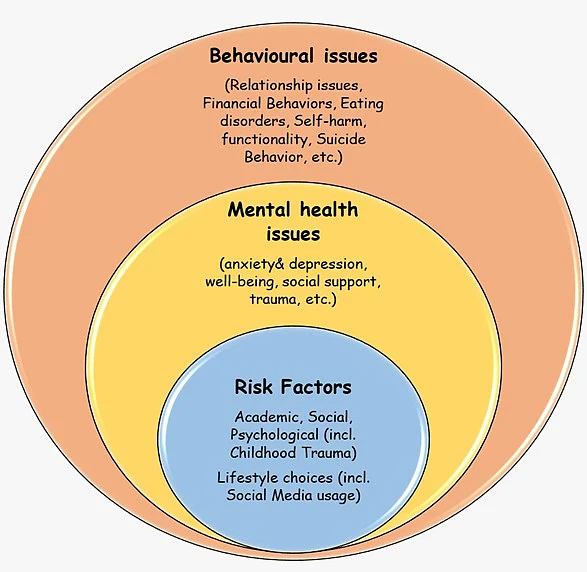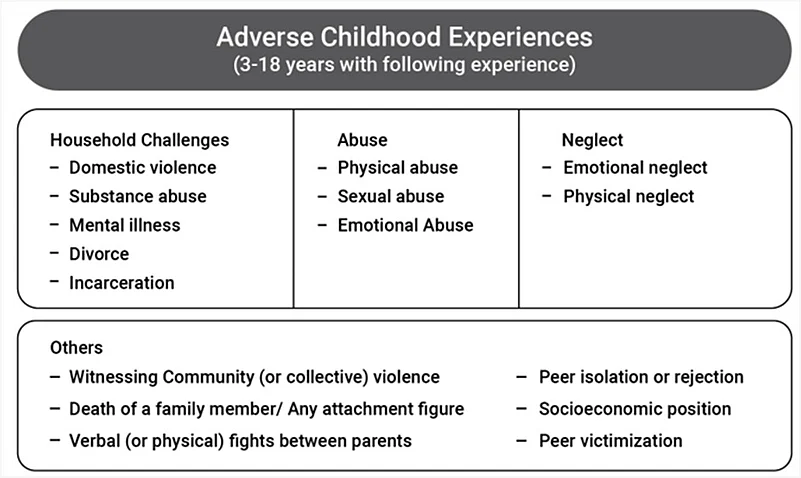By Amit Trivedi
“Bachpan se lekar aaj tak, sirf business meetings ke liye hi to aapne mujhe bulayaa hai, daddy. Jab se maine hosh sambhala, mujhe yaad nahin padta ki business ke alaava bhi aapne mujhe kisi baat ke liye bulayaa ho. Bulayaa hai, aapne?”
These lines in the baritone of Amitabh Bachchan from the movie Sharaabi (1984) tell the story of a neglected child who became an alcoholic adult. It’s also a classic case of the impact of childhood trauma or adverse childhood experiences (ACE) on the behaviour of an adult.
Though sometimes depicted in films, it is well-researched and documented that ACEs have negative, lasting impacts on health parameters such as anxiety, depression, and the well-being of adults. Some of these issues can affect the behaviour of an individual, which can then directly impact financial decisions as well (see Impact Of Childhood Trauma). These findings, among others, are part of a paper, Explaining Childhood Trauma’s Impact On Women’s Financial Well-Being, I recently presented along with Ruhi Pabari, regression therapist and life coach, Wellness Space and Gunjan Y Trivedi, co-founder of Society For Energy and Emotions, Wellness Space.
HL: Impact Of Childhood Trauma

Impact On Financial Well-Being
In the paper, we studied if there is a correlation between adverse childhood experiences and financial well-being in adulthood. The study revealed a clear negative correlation between the ACE scores and financial well-being in adulthood. Those with high ACE scores (higher exposure to childhood trauma) scored low on financial well-being and vice versa. While the adverse childhood experience happened when the woman was below 18 years of age, the trauma remained etched in the mind and impacted financial well-being even years later.
Let’s take a real-life example from a book I authored along with Sebi-registered investment advisor Kiran Telang, Moneywise – Perspectives for Women, to understand this further. The example is of a couple who threw parties regularly; it was seen as attention-seeking behaviour. Such parties eventually led the couple to get deeply into debt, which led to extreme stress in their relationship and separation. While they tried to find a solution to their fear of being ignored by their friends and colleagues, they ruined their married and financial lives. They ended up self-harming themselves.
The question then is: why do people resort to self-harm which eventually affects their decisions? The trauma one experiences often leave a scar that remains etched in the memory for long. If the intensity of the trauma is high, it causes stress; often continuous and extreme. It is as if one is constantly looking over one’s shoulders for some imaginary threat. Under the spell of such a threat, it is impossible to think rationally or to plan for the future, as one would be focused only on immediate survival.
This clearly explains why people with higher exposure to trauma may be unable to plan for the future, including their financial future. In any case, the financial well-being is likely to be negatively impacted. And financial well-being would eventually impact the overall well-being and vice versa.
So what kind of trauma are we talking about? There are 16 different types of such experiences, grouped in four different buckets as highlighted by published research on childhood trauma’s impact on mental health by Co-author of this study Gunjan Y Trivedi & team earlier. These are highlighted as under:

Can This Be Reversed?
While trauma has a negative role, it is important to understand how financial well-being may be improved despite the challenges.
For that, one has to overcome the tendency to pass the blame and take charge of one’s own life and improve the current situation.
As Amitabh Bachchan tells his father in Sharaabi: “Sharaab ki botal pe agar main label ke tarah chipak gaya hoon, toh iss label ko chipkaane waale aap hain.” While Amitabh (in Sharaabi) suffered a trauma, that was not his fault, it was his life that was impacted the most. As the above dialogue demonstrates, he chose to blame his father, but not do anything to improve his own life. A similar behaviour pattern may not be ruled out in women. Such an approach may not just result in them making mistakes, but also making them vulnerable to financial frauds.
So, the only option is to take charge and fight the challenges by seeking help from the community or professionals or both.

Disclaimer: Views expressed are personal and do not necessarily reflect the official position or policy of the Outlook Media Group or its employees.









